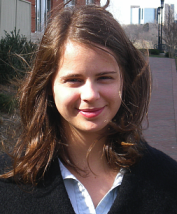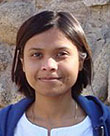We’re still in the midst of reviewing applications for the 2011-12 Computing Innovation Fellows Project, but I thought I would take a moment today to begin highlighting the stories of our current and former CIFellows.
The CIFellows Project was always intended to provide recent Ph.D.s in computer science (and allied fields) with short-term postdoctoral positions in academia and industry, to keep them in research and teaching despite the economic downturn. In the past two years, we’ve heard great things about the CIFellows, the CIFellow-mentor relationships, the research results borne out of the program, and, most importantly, the outcomes for many of the CIFellows in terms of the permanent opportunities that have opened up for them as a result of their CIFellowship experiences.
Over the next few weeks, I’ll be sharing in this space the backgrounds and research projects of some of our current CIFellows — in most cases in under 1,000 words for each CIFellow. As a reminder, the CIFellows Project supports recent Ph.D.s for up to two years — so the 2009 CIFellows featured below (and in future postings) will be departing the program later this summer. A majority of the 2010 CIFellows are continuing for a second year to complete their research projects and begin the job search process.
Read about the first six — bright young stars who stand to become of our field’s future leaders! — after the jump…
 Jeffrey Johns (2009 CIFellow)
Jeffrey Johns (2009 CIFellow)
Ph.D.-granting college/university: University of Massachusetts-Amherst
Mentor, host organization: Ronald Parr, Duke University
Biography: Jeff Johns recently departed Duke University’s Department of Computer Science for a research position in government. He received his M.S. (2006) and Ph.D. (2010) in computer science from the University of Massachusetts-Amherst where he was a member of the Autonomous Learning Laboratory specializing in artificial intelligence. Prior to returning to graduate school, Jeff’s work experience included time as a data mining analyst at Capital One and as an engineer for DuPont, having earned his B.S. in chemical engineering from the University of Virginia in 1998.
Research Project: Jeff’s research addresses the fundamental question of how an autonomous agent can learn to represent its environment. With the right representation, it subsequently becomes much easier for the agent to learn how best to act. To construct useful representations from sensory data, Jeff has explored techniques from mathematical optimization, sparse methods, and harmonic analysis. His most recent work appeared at the Neural Information Processing Systems (NIPS) conference in December 2010 where he gave a plenary presentation.
 Caroline Ziemkiewicz (2010)
Caroline Ziemkiewicz (2010)
Ph.D.-granting college/university: University of North Carolina-Charlotte
Mentor, host organization: David Laidlaw, Brown University
Biography: Caroline Ziemkiewicz received her Ph.D. in computer science in the Charlotte Visualization Center at the University of North Carolina-Charlotte, and a Graduate Certificate in cognitive science from the same institution. She is currently at the Visualization Research Lab at Brown University.
Research Project: Caroline studies how information visualization structures a user’s thinking process. She has published work on the relationship between linguistic and visual metaphors, the role of implied dynamics in graph interpretation, and individual differences in visualization use. Her current research studies how visualizations with multiple linked views influence the way a user approaches a task.
Sharoda Paul (2010)
Ph.D.-granting college/university: Pennsylvania State University
Mentor, host organization: Ed Chi, Google, and Peter Pirolli, PARC
Biography: Sharoda Paul is working in the Augmented Social Cognition group at the Palo Alto Research Center (PARC). She received her Ph.D. in Information Sciences and Technology from Penn State University. During her graduate studies, she completed two internships at Microsoft Research in Redmond, WA. Sharoda also holds a Bachelor’s degree in computer sciences and engineering from India.
Research Project: Sharoda conducts research in the areas of human-computer interaction, computer supported cooperative work (CSCW), social computing, and healthcare informatics. As part of her dissertation, she examined how groups of people together find and make sense of information during collaborative information-seeking activities in two domains — healthcare and Web search. Sharoda is currently studying social Q&A, examining how people use their social networks to fulfill their information needs.
 Yuho Jin (2009)
Yuho Jin (2009)
Ph.D.-granting college/university: Texas A&M University
Mentor, host organization: Timothy Pinkston, University of Southern California
Biography: Yuho Jin is working in the Computer Engineering Division of the Ming Hsieh Department of Electrical Engineering at the University of Southern California. He will be joining the New Mexico State University’s Department of Computer Science as an assistant professor later this year. Yuho received his Ph.D. in computer engineering from the Department of Computer Science and Engineering at Texas A&M University. He received his B.S. and M.S. degrees in computer science from the Department of Computer Science at the Korea Advanced Institute of Science and Technology.
Research Project: Yuho’s research interests span on-chip interconnection networks, memory systems, multicore architectures, parallel computing, and performance evaluations. To design on-chip networks more optimally and flexibly such that they take better advantage of the shape of traffic in applications running on a multicore chip, he is pursuing traffic characterization and modeling methods capable of exploiting runtime characteristics. Ultimately, Yuho is taking a holistic approach by considering the design and management of on-chip networks together with the cache memory to realize network-driven multicore architecture for performance improvement of multithreaded applications.
 Sushmita Roy (2009)
Sushmita Roy (2009)
Ph.D.-granting college/university: University of New Mexico
Mentor, host organization: Aviv Regev, Broad Institute of MIT & Harvard
Biography: Sushmita Roy is currently at the Broad institute of MIT and Harvard. This fall, she will join the University of Wisconsin-Madison as a tenure-track faculty. Sushmita’s research intersects the fields of computer science and biology. At the Broad Institute, Sushmita is developing novel machine learning and data mining algorithms to maximally interrogate large functional genomics datasets. She is working in close collaboration with biological domain experts to validate model predictions and identify new experiments that are needed to better understand information processing in living systems. Sushmita is also mentoring undergraduate and graduate students from computer science, biology, and physics.
Research Project: Sushmita is interested in gaining a systems-level understanding of how living cells process environmental information and respond to environmental assaults. Such an understanding is important for health and biomedical research, and can also provide insight to design robust computing and information processing systems. Central to this information processing machinery are biochemical networks that comprehensively describe the state of living cells. Sushmita’s current projects focus on developing algorithms for learning regulatory networks across multiple species by exploiting evolutionarily conserved information. These networks can then be compared across organisms and conditions to identify the design principles that drive the structure of networks in complex systems such as living cells.
Andrew McPherson (2009)

Ph.D.-granting college/university: University of Pennsylvania
Mentor, host organization: Youngmoo Kim, Drexel University
Biography: Andrew McPherson is at Drexel University, where his research brings together his dual backgrounds in music and engineering. Andrew completed his undergraduate and Master’s work at MIT, earning S.B. and M.Eng. degrees in EECS and a S.B. in music. He subsequently completed a Ph.D. in music composition at the University of Pennsylvania in 2009. In addition to his research activities, Andrew remains active as a classical composer with performances across the U.S., including at the Tanglewood and Aspen music festivals.
Research Project: Andrew’s research uses computing to model and support creative musical expression, with two main foci. First, he is building computationally-augmented acoustic instruments: by using embedded sensors and actuators to enhance the expressive capabilities of familiar instruments, his work seeks to establish a role for computing in traditionally technology-averse musical communities. Second, his research explores relationships between musical performance and human-computer interaction, developing quantitative models of physical performance gestures which can be used to develop more expressive, intuitive computer interfaces.
Again, stay tuned for more CIFellows’ profiles soon…
(Contributed by Erwin Gianchandani, CCC Director)










Trackbacks /
Pingbacks